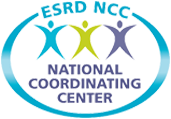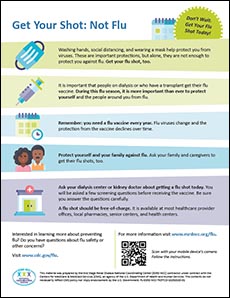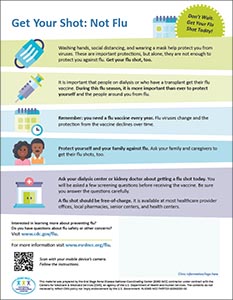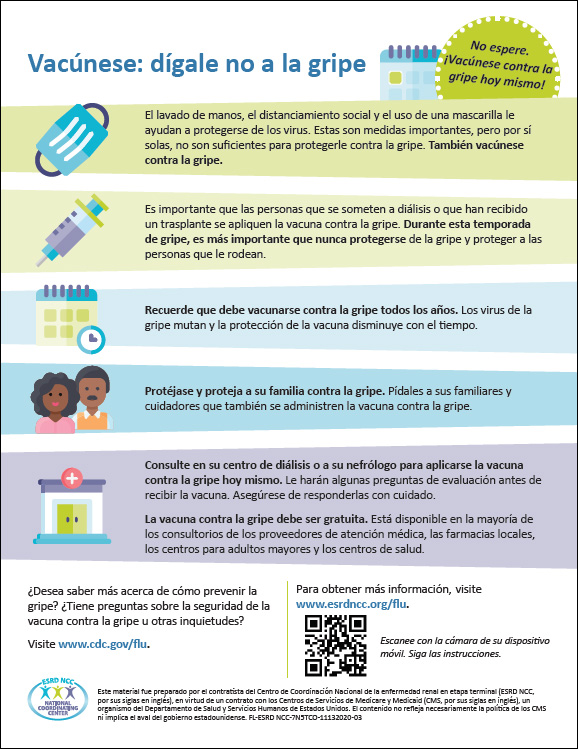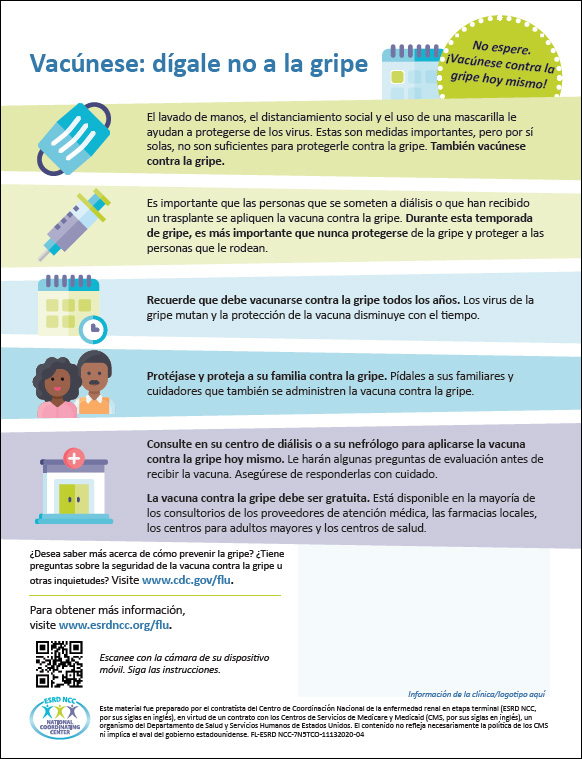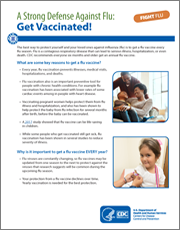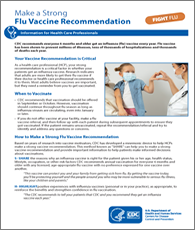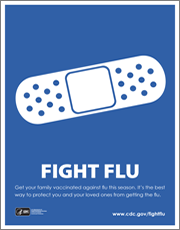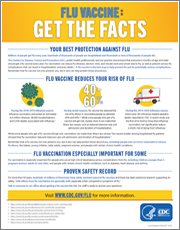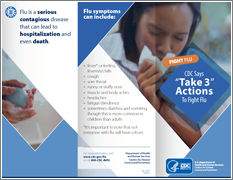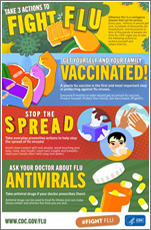
The ESRD population is considered a high risk group and can develop serious flu complications, which may result in hospitalizations and even death. Use the ESRD Flu Toolkit to help educate patients and healthcare workers about the importance of a flu vaccine. The ESRD Flu Toolkit contains flu preventive and safety messages you can share in your newsletters, messages, and on your social media channels. You can either copy these messages directly or customize them to reach your audience.
There is more than one strain of flu, so the terms “flu” or “a flu” are used in this toolkit instead of “the flu.”
Communicate about the risks of a flu and the importance of a vaccine with any of the following taglines. Use any of the below taglines in newsletters, on fax coversheets, or through e-mail campaigns.
When to Get the Vaccine
- Ask your dialysis center or kidney doctor about getting a flu shot today. You will be asked a few screening questions before receiving the vaccine. Be sure you answer the questions carefully.
- The best way to prevent seasonal flu is to get vaccinated every year. According to the Centers for Disease Control and Prevention (CDC) it takes about two weeks after vaccination for antibodies to develop in the body and provide protection against flu.
- The CDC recommends that people, including dialysis patients and transplant recipients, get a flu vaccine by the end of October. If you haven’t received your vaccine yet there is still time. Vaccination should continue throughout flu season, even beyond January.
Flu and COVID-19
- The CDC states there is no evidence that getting a flu vaccine increases your risk of getting sick from a coronavirus, like the one that causes COVID-19.
- Getting a flu vaccine will not protect against COVID-19. However, flu vaccine has been shown to reduce the risk of illness, hospitalization, and death.
- For individuals who receive dialysis treatment or who have a kidney transplant, getting a flu vaccine is more important than ever during 2020-2021. It will protect you and the people around you from flu. It will also help reduce the strain on healthcare systems responding to the COVID-19 pandemic.
Benefits
- Getting vaccinated may also protect people around you.
- Flu vaccination can keep you from getting sick with a flu. Every year, flu vaccination prevents illnesses, medical visits, hospitalizations, and deaths.
- While some people who get vaccinated still get sick, flu vaccination has been shown in several studies to reduce severity of illness.
Source: www.cdc.com
These Facebook and Twitter messages were created to help you convey the facts about flu vaccine and tthe importance of getting vaccinated.
Facebook-ready Messages
- Getting a #flu vaccine can reduce your risk of getting flu. That helps save resources for people fighting COVID-19
- It’s flu season. People with #kidneydisease are more vulnerable to flu and pneumonia. #GetVaccinated
- Getting a #flu vaccine is more important than ever, especially for people who are receiving #dialysis or who are #transplanted. Protect yourself and your family. Get Vaccinated. #FightFlu
- The best way to prevent #flu is to get vaccinated. Medicare and most insurance plans fully cover flu vaccination. Ask your care team about getting a #Flu shot
- Getting a #Flu vaccination is especially important for people with certain medical conditions, like high blood pressure, diabetes and #kidneydisease. People with these types of conditions are at higher risk of developing serious complications from flu. #FightFlu
- A #Flu vaccination has been shown to reduce the risk of getting sick with flu or reduce the risk of having a serious flu outcome like requiring a stay in the hospital. #GetVaccinated
- During last year’s flu season, @CDCgov estimates there were 38 million flu illnesses, 18 million flu-associated medical visits, 400,000 flu hospitalizations and 22,000 flu-associated deaths. Don’t let that happen this season. #FightFlu #GetVaccinated
- The @CDCgov has a 2020-21 #Flu Season Digital Media Toolkit. It provides resources to promote #Flu prevention and vaccination. Check it out https://www.cdc.gov/flu/resource-center/freeresources/toolkit.htm
Twitter-ready Messages
Tweet |
Character Count |
| Clean Hands Count! #Latherup and wash your hands regularly. #FightFlu | 69 |
| Getting your #flu vaccine reduces the risk of hospitalization. #GetVaccinated | 78 |
| #ESRDNetworks support the @CDCgov campaign to #FightFlu. If you have kidney disease, get yourself and your family members vaccinated today. | 137 |
| Getting a #Flu vaccine this year is more important than ever before for dialysis and kidney transplant recipients because of the ongoing COVID-19 pandemic. #FightFlu | 165 |
| A #Flu vaccination has been shown to reduce the risk of getting sick with flu or reduce the risk of having a serious flu outcome like requiring a stay in the hospital. #GetVaccinated | 182 |
| A #Flu vaccine prevents millions of illnesses and flu-related doctor’s visits each year. #GetVaccinated | 103 |
| If you’re over the age of 65, ask about the high dose #Flu vaccination for a stronger immune response. #FightFlu | 112 |
| @CDCgov estimates that #Flu vaccination prevented 7.5 million flu illnesses, 3.7 million flu medical visits, 105,000 flu hospitalizations and 6,300 flu deaths last year. #GetVaccinated. #FightFlu | 196 |
| Learn more about the difference between COVID-19 and seasonal #Flu https://www.cdc.gov/flu/season/faq-flu-season-2020-2021.htm | 126 |
| Practice social distancing by putting space between yourself and others. Wash your hands often. Always #MaskUp. Slow the spread of COVID-19 and #Flu | 148 |
| Check out this video Roll Up Your Sleeve for Your Annual Flu Vaccination and #GetVaccinated against #Flu | 104 |
Get Your Flu Shot: Not Flu
Roll Up Your Sleeve for Your Annual Flu Vaccine
What Should You Do If You Get Flu?
Key Facts About Flu Vaccines
Click any resource to view or download the material.
COVID-19 vs Flu: Breaking Down the Differences
Tuesday, October 20, 2020 — 4:00 PM to 5:00 PM ET
Influenza, COVID-19, and Renal Disease
Tuesday, November 10, 2020 — 3:00 PM to 4:00 PM ET
